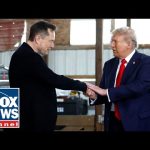The recent joint interview featuring President Donald Trump and Elon Musk on Fox News, moderated by Sean Hannity, offered a fascinating glimpse into the evolving dynamics of political power and cultural influence in America. The conversation underscored the growing alliance between Trump and Musk, two figures who have become lightning rods for both admiration and controversy. Their discussion revealed not only their shared disdain for bureaucratic inefficiency but also their mutual understanding of how to leverage their platforms to shape public opinion and policy. For conservatives, this partnership represents a bold challenge to entrenched government structures and a rallying cry for those frustrated with the status quo.
Elon Musk’s remarks about his shifting relationship with the political left were particularly striking. Once celebrated as a progressive icon for his innovations in electric vehicles and renewable energy, Musk has become a polarizing figure among liberals. He attributed this shift to what he called “Trump Derangement Syndrome,” describing the irrational hostility he encounters when Trump’s name is mentioned. Musk’s observations highlight a broader cultural divide where reasoned discourse is increasingly replaced by reactionary outrage. This phenomenon resonates with many conservatives who have long criticized the left for prioritizing emotional responses over substantive debate.
The interview also showcased the pair’s shared commitment to dismantling what they describe as an overreaching federal bureaucracy. Musk, now heading the Department of Government Efficiency (DOGE), has spearheaded efforts to streamline government operations, cut wasteful spending, and reduce regulatory burdens. Conservatives have long championed such reforms as essential to restoring accountability and efficiency in government. Trump’s praise for Musk’s work reflects a broader conservative belief in empowering private-sector leaders to bring innovation and discipline to public administration—a stark contrast to the Democratic Party’s reliance on expansive government programs.
Predictably, Democrats have reacted with alarm to this alliance, accusing Musk of wielding unelected power and undermining democratic institutions. Their protests, however, often come across as disorganized and out of touch, with rhetoric that alienates more voters than it persuades. For example, labeling Musk a “Nazi nepo baby” or accusing him of a “heist” reeks of desperation rather than offering constructive criticism. These tactics not only fail to resonate but also underscore the Democratic Party’s broader struggle to connect with an electorate increasingly skeptical of its messaging.
Ultimately, the Trump-Musk partnership represents a seismic shift in how Americans view leadership and governance. Their emphasis on transparency, efficiency, and results speaks to a growing demand for authenticity in politics—a demand that traditional institutions have struggled to meet. For conservatives, this moment serves as both validation of their principles and a call to action: to continue pushing for reforms that prioritize individual freedom, fiscal responsibility, and accountability over bloated bureaucracy. As Trump and Musk illustrate, leadership grounded in these values can inspire not just loyalty but also meaningful change in an era defined by political polarization.




